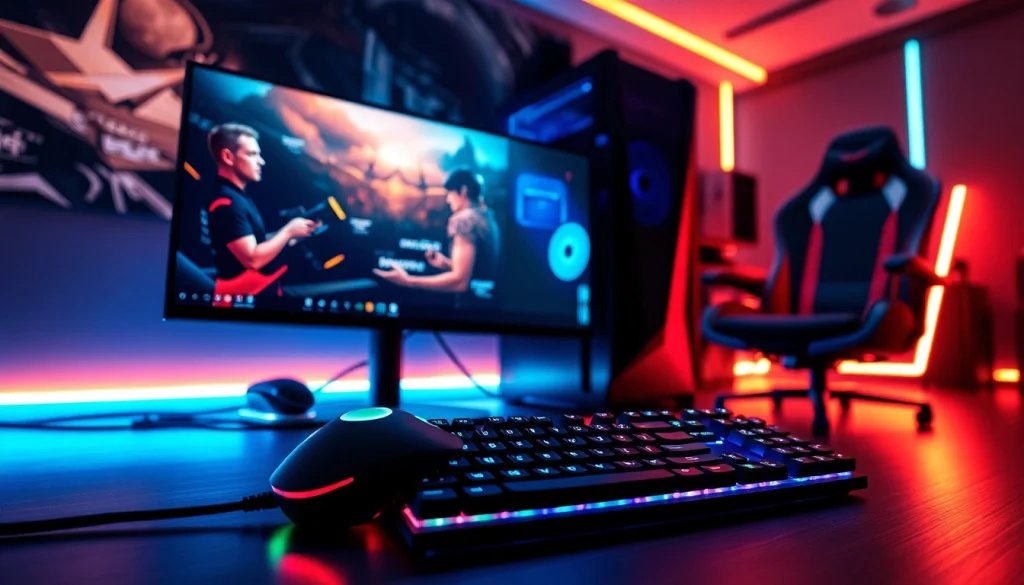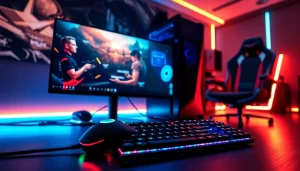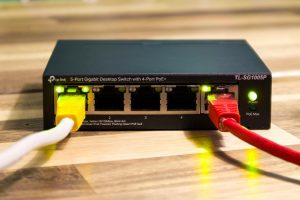Maximizing Performance: The Essential Guide to Choosing Your Gaming Computer

Understanding Gaming Computer Components
When it comes to gaming, choosing the right components for your system is crucial to achieving optimal performance and visual fidelity. The landscape of gaming computers is richly varied, from casual setups capable of handling less demanding titles to high-end machines designed for eSports competitions. Every aspect of a gaming computer contributes to user experience, so understanding these elements can profoundly affect your gaming journey. One of the fundamental articles you’ll need to explore is the Gaming Computer selection, so let’s dive into what makes these machines tick.
Key Specifications to Consider
When shopping for a gaming computer or planning a custom build, there are several key specifications you need to pay attention to. These specifications will determine how well the computer can handle different games and productivity tasks:
- Processor (CPU): The CPU is the brain of your computer, executing instructions and performing calculations. A powerful CPU can significantly enhance performance, particularly in CPU-intensive games and applications.
- Graphics Card (GPU): The GPU plays a crucial role in rendering images and graphics. Gamers looking for high frame rates and superior visuals should opt for higher-end GPUs with ample VRAM.
- Memory (RAM): Sufficient RAM is essential for smooth multitasking and ensuring games run without hiccups. Most gaming PCs now come with at least 16GB of RAM, which is usually sufficient for most scenarios.
- Storage: Solid State Drives (SSDs) offer faster load times compared to traditional Hard Disk Drives (HDDs). Gaming PCs often benefit greatly from having an SSD, especially for quickly loading games.
- Motherboard: Choose a motherboard that not only fits your CPU choice but also supports all the necessary features and expansions.
Importance of Graphics Card Performance
The GPU is arguably the most significant component in any gaming build. High-end graphics cards can deliver stunning visuals and seamless gameplay, while lower-end models may struggle with the latest titles. When choosing a graphics card, consider the resolution at which you intend to play and the graphic settings you prefer:
- Resolution: The higher the resolution, the more demanding the game will be on your GPU. If you’re gaming at 1440p or 4K, investing in a powerful GPU becomes paramount.
- Frame Rate: A higher frame rate results in smoother gameplay, especially in fast-paced games. Graphics cards with technologies like NVIDIA’s G-Sync or AMD’s FreeSync can help prevent screen tearing and provide seamless visuals.
- Ray Tracing: Modern GPUs now support ray tracing, a rendering technique that simulates real-world lighting for more realistic graphics. If you’re a graphics enthusiast, this feature is something to look out for.
How RAM Affects Your Gaming Experience
RAM is essential for managing workloads, allowing faster access to data and smoother transitions between tasks. In gaming, RAM impacts game loading times, how many applications can run simultaneously, and overall system responsiveness:
While 8GB can suffice for older titles and light gaming, 16GB is becoming the standard for most modern games, especially those with vast open worlds and rich graphics. High-end gaming builds often aim for 32GB to ensure that multitasking doesn’t impact gaming performance.
Selecting the Right Gaming Computer for Your Needs
Understanding your own gaming preferences and needs is vital when choosing a gaming computer. By identifying how you intend to use your gaming rig, you can make more informed decisions that best fit your lifestyle.
Casual vs. Competitive Gaming Requirements
Casual gamers often prioritize playability and enjoyment over ultra-settings and high frame rates. For these users, a mid-range gaming computer with decent specifications is typically sufficient. On the other hand, competitive gamers require top-tier hardware to achieve the fastest response times and the best possible performance:
- Casual Gaming: Focus on a balanced machine with a good graphics card, fast storage, and adequate RAM. Games like Stardew Valley, Fortnite, or Overwatch won’t require top-tier graphics cards.
- Competitive Gaming: Investing in a high-refresh-rate monitor, low latency hardware, and top-tier graphics cards is paramount. Titles like CS:GO, Rainbow Six Siege, or Dota 2 demand very high performance to gain a competitive edge.
Brands and Models: What to Look For
Choosing a reliable brand can greatly influence your gaming experience. Look for manufacturers known for their build quality, customer support, and warranty options:
- Build Quality: Always check reviews regarding the longevity and durability of the computer components.
- Support: Brands that cover warranties and offer support can save you considerable hassle if issues arise.
- Customization Options: Some manufacturers allow for deeper customization in components, which could be critical if you have specific needs or preferences.
Budgeting Tips for Your Gaming Computer
A well-planned budget will mitigate the overwhelming nature of shopping for gaming computers. Follow these tips to ensure you allocate your funds wisely:
- Set a Budget: Determine how much you are willing to spend on your gaming setup. Understand that a powerful PC will cost more, but it is an investment in your gaming experience.
- Prioritize Components: Allocate your budget based on components that will impact your gaming experience the most, prioritizing the GPU and CPU over other parts.
- Look for Deals: Be on the lookout for seasonal sales or special promotions that could significantly lower the cost of components.
Setting Up Your Gaming Computer for Success
Once you’ve selected your gaming computer, it’s time to ensure you set it up correctly for the best performance. The right setup can not only enhance your gaming experience but also improve your comfort and efficiency during long gaming sessions.
Essential Accessories to Enhance Gameplay
Accessories can elevate your gaming experience greatly. Consider investing in the following:
- Monitor: A gaming monitor with a high refresh rate can make a significant difference.
- Keyboard and Mouse: Gamers often benefit from mechanical keyboards and highly precise gaming mice that come with customizable buttons.
- Headset: Quality audio can immerse you in the game, so invest in a good headset with clear sound and a responsive microphone.
- Mouse Pad: A gaming mouse pad can help improve mouse accuracy and control.
Optimizing Settings for Maximum Performance
Getting the most out of your gaming computer often requires fine-tuning settings, whether in-game or within your operating system:
- Graphics Settings: Adjust settings like texture quality, shadows, and reflections for a balance between quality and frame rate.
- System Optimization: Disable unnecessary background processes and software that can adversely affect performance.
- Driver Updates: Always ensure that your GPU drivers are up-to-date for optimal performance.
Creating an Ergonomic Gaming Environment
An ergonomic setup is crucial for maintaining comfort during prolonged gaming sessions. Consider these factors:
- Chair: Invest in a comfortable chair that provides good support to your back.
- Desk Height: Ensure your desk height is appropriate for your computer setup to prevent strain.
- Monitor Position: Position the monitor at eye level to minimize neck strain.
Common Troubleshooting for Gaming Computers
Even the most powerful gaming computers can encounter issues. Being aware of common problems and their solutions can save you time and frustration.
Identifying Performance Issues
Performance problems can stem from various sources. Here are some common issues to check:
- Temperature Issues: Monitor CPU and GPU temperatures to avoid overheating. Clean fans and radiators regularly.
- System Freezes or Crashes: Regularly update drivers and software. Check for malfunctioning components if issues persist.
- Low Frame Rates: This can often be resolved by adjusting graphics settings or checking for CPU/GPU bottlenecks.
Maintaining Your Gaming Computer
Regular maintenance will prolong the life of your gaming system and ensure optimal performance:
- Cleaning: Dust accumulation can impact cooling efficiency. Regularly clean your hardware.
- Software Updates: Keep all system drivers, game clients, and your operating system up to date.
- Backup Data: Regularly back up your important data to avoid losing progress in games or important files.
When to Seek Professional Help
If you encounter issues that cannot be resolved through troubleshooting, it might be time to seek professional assistance. Unresolved hardware malfunctions, persistent performance issues, or complex software errors can often require expert intervention:
- Persistent Performance Problems: If adjusting settings and reinstalling drivers does not help, a hardware diagnosis may be necessary.
- Hardware Upgrades: If you’re considering significant upgrades, consulting a professional can ensure you make the right choices and avoid compatibility issues.
- Physical Damage: Professional repair services can help resolve issues from accidental damage, which might void warranties if improperly handled.
Future Trends in Gaming Computer Technology
The gaming industry is rapidly evolving, with new technologies pushing the boundaries of what gaming computers can do. Understanding these trends can help you future-proof your gaming setup.
Emerging Hardware Developments
New hardware developments are happening at an unprecedented rate. Keep an eye on:
- Next-Generation GPUs: Expect even more power from forthcoming graphics cards, with significant enhancements in ray tracing and AI capabilities.
- Faster CPUs: Advancements in CPU designs will continue to impact gaming, especially in CPU-intensive scenarios.
- Memory Innovations: The introduction of DDR5 RAM promises improved speeds and efficiency, which will benefit gaming and productivity alike.
The Rise of Virtual Reality Gaming
Virtual reality is becoming increasingly accessible, with investments in VR technology changing the gaming landscape. Key considerations as VR gaming technology advances include:
- Graphics Requirements: VR games typically require higher graphics performance; therefore, optimizing your system for VR is essential.
- Hardware Compatibility: Ensure your gaming computer meets the requirements for the latest VR headsets and accessories.
Understanding Cloud Gaming Solutions
The emergence of cloud gaming solutions is transforming how players access and experience games, allowing high-end gaming experiences without the need for powerful local hardware. When considering cloud gaming, keep in mind:
- Internet Speed: A stable, high-speed internet connection is crucial for an optimal cloud gaming experience.
- Latency Issues: While cloud gaming can reduce the need for high-end hardware, it may introduce latency challenges, especially in fast-paced games.







